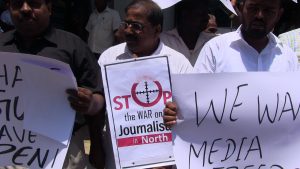While the visit of U.S. Secretary of State Mike Pompeo and the parliament’s approval of the 20th Amendment Act (20A) have dominated the headlines in Sri Lanka in recent months, attacks on journalists in that country remain an underreported issue. Violations of press freedom in Sri Lanka are well-known, peaking in late 1980s, and again between 2005 and 2010. According to the World Press Freedom Index compiled by Reporters Without Borders, Sri Lanka ranks 127th out of a total 178 countries, making it one of the world’s most difficult countries for journalists.
On October 12, two journalists of the Tamil Guardian newspaper, Kanapathipillai Kumanan and Shanmugam Thavaseelan, were attacked as they were reporting on illegal timber smuggling in Murippu (Mullaitivu District) in the Tamil-dominated north of Sri Lanka. The attackers also mugged and threatened to kill them. Despite lodging a complaint at the Mullaitivu Police Station, the journalists weren’t convinced the culprits would be arrested, since other similar incidents remain unsolved. Previously, Kumanan and Thavaseelan were subjected to threats and intimidation by Sri Lankan security forces, but the recent attack on them is the most violent so far. Meanwhile, The International Federation of Journalists and its Sri Lankan affiliates – The Sri Lanka Working Journalists’ Association, The Free Media Movement, and the Federation of Media Employers Trade Union – also condemned the attacks and urged the Sri Lankan government to bring the perpetrators to justice.
The Jaffna Press Club issued a statement, pointing out the lack of justice for journalists as no culprits have been prosecuted for the attacks, and demanded an end to the culture of impunity through fair investigations. A potential hindrance to ensuring justice is the approval of 20A, a law that gives the Sri Lankan president the authority to appoint judges and police officers which, in turn, could hinder the independent and impartial investigations of attacks on journalists and others. According to the Committee to Protect Journalists, 10 journalists were murdered in Sri Lanka between 1999 and 2009, including Mylvaganam Nimalarajan, who was killed in 2000. In addition to those killed, at least 14 journalists remain missing to date. This has led to hundreds of Sri Lankan journalists to forcibly choose exile.
Between 2005 and 2015, when Mahinda Rajapaksa was president of Sri Lanka, the country witnessed considerable turmoil. This included the brutal end to the civil war in 2009, which was accompanied by allegations of gross human rights violations, including the kidnapping, torture, and murder of Tamil civilians, journalists, and activists. From 2015 to 2019, under the Ranil-Sirisena government, press freedom improved with the easing of media restrictions; journalists were able to speak openly without fear of censorship after a long time. During this period, an independent commission was also established to launch investigations into the murder and torture of journalists, and the arbitrary arrests and disappearances that had taken place since end of the civil war.
In spite that effort, questions remain unanswered and culprits remain unpunished. This relative improvement was short-lived with the return of Gotabaya Rajapaksa as president of Sri Lanka in November 2019, an election that sent shockwaves through journalistic circles, as reporters feared the return of abuse and violence at the hands of the state.
When Gotabaya was defense secretary between 2005 and 2015, the period was termed as the “dark decade” for Sri Lankan press freedom, rife with allegations that journalists and activists who were considered a threat to the government were kidnapped or murdered. These allegations were repeatedly dismissed by the Rajapaksa brothers.
The return of Rajapaksa brothers is likely to hinder further improvements in Sri Lankan press freedom, since the press is the only entity that openly speaks out against the government, with the state, courts, and the police once again controlled by an executive with significant powers, following the approval of 20A.
Is it possible to alter Sri Lanka’s course, away from an authoritarianism fueled by censorship and fear? Maybe not, but one can only hope.
Jeevethan Selvachandran holds an MA in India and South Asia Studies from Aarhus University, Denmark.

































